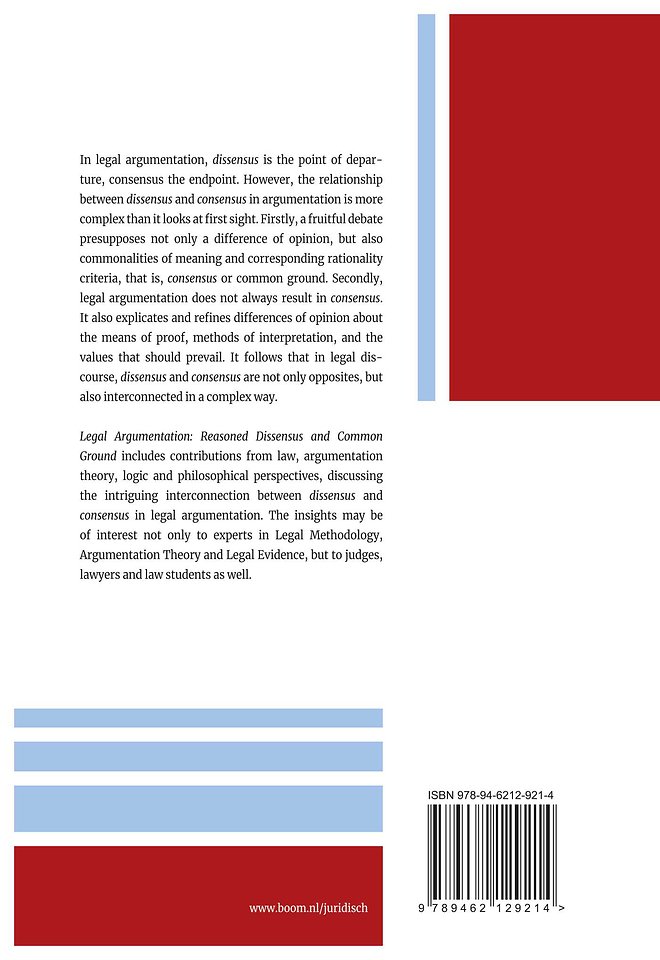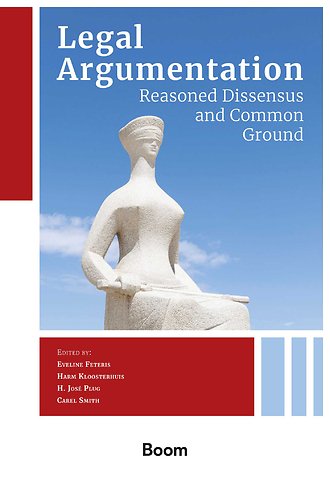Legal argumentation
Reasoned dissensus and common ground
Samenvatting
In legal argumentation, dissensus is the point of departure, consensus the endpoint. However, the relationship between dissensus and consensus in argumentation is more complex than it looks at first sight.
First, a fruitful debate presupposes not only a difference of opinion, but also commonalities of meaning and corresponding rationality criteria, that is, consensus or common ground. Second, legal argumentation does not always result in consensus. It also explicates and refines differences of opinion about the means of proof, methods of interpretation, or the values that should prevail. It follows that in legal discourse, dissensus and consensus are not only opposites, but also interconnected in a complex way.
Legal Argumentation: Reasoned Dissensus and Common Ground includes contributions from law, argumentation theory, logic and philosophical perspectives, discussing the intriguing interconnection between dissensus and consensus in legal argumentation. The insights may be of interest not only to experts in Legal Methodology, Argumentation Theory and Legal Evidence, but to judges, lawyers and law students as well.
Trefwoorden
Specificaties
Inhoudsopgave
Sanne Taekema
Introduction ix
Eveline Feteris, Harm Kloosterhuis, H. José Plug and Carel Smith
Resolving dissensus
Does virtue deepen disagreement in law? 3
Amalia Amaya
Legal interpretation and the risk account of scientific objectivity 21
Maija Aalto-Heinilä
What to do when experts disagree on judicial fact-finding? 35
Damiano Canale
The use of literary references in the justification of separate opinions 45
H. José Plug
An introduction to the economic analysis of law as a legal theory in improving legal argumentation and judicial decision-making for IP law in Europe 55
Dimitris Xenos
Dissensus and the role of context
Contextual contingency of social rules 67
Damir Banović
Defeasibility: a contextualist view 75
Ross Charnock
Consensus in concepts? A brief exploration 85
Véronique Schirrmeister
Fallacies concerning linguistic argumentation in law 95
Harm Kloosterhuis and Carel Smith
Dissensus and evidence
Probability clerks and probability judges. Or how to prevent probabilistic fallacies in court 111
Anne Ruth Mackor
The virtue of being disagreeable. Identifying disagreement about legal evidence 121
Christian Dahlman
Robust evidential probability and reasonable doubt 133
Hylke Jellema
The pragmatics of evidence discourse: arguments from ostension 143
Giovanni Tuzet
The function of dissensus
The Rule of Law and its procedural implications 155
Briain Jansen
Forensic rhetoric and conflict resolution. Enforcing agreements through emotion 165
Serena Tomasi
Anderen die dit e-book kochten, kochten ook
Rubrieken
- cadeauboeken
- computer en informatica
- economie
- filosofie
- flora en fauna
- geneeskunde
- geschiedenis
- gezondheid
- jeugd
- juridisch
- koken en eten
- kunst en cultuur
- literatuur en romans
- mens en maatschappij
- naslagwerken
- non-fictie informatief/professioneel
- paramedisch
- psychologie
- reizen
- religie
- schoolboeken
- spiritualiteit
- sport, hobby, lifestyle
- thrillers en spanning
- wetenschap en techniek
- woordenboeken en taal









